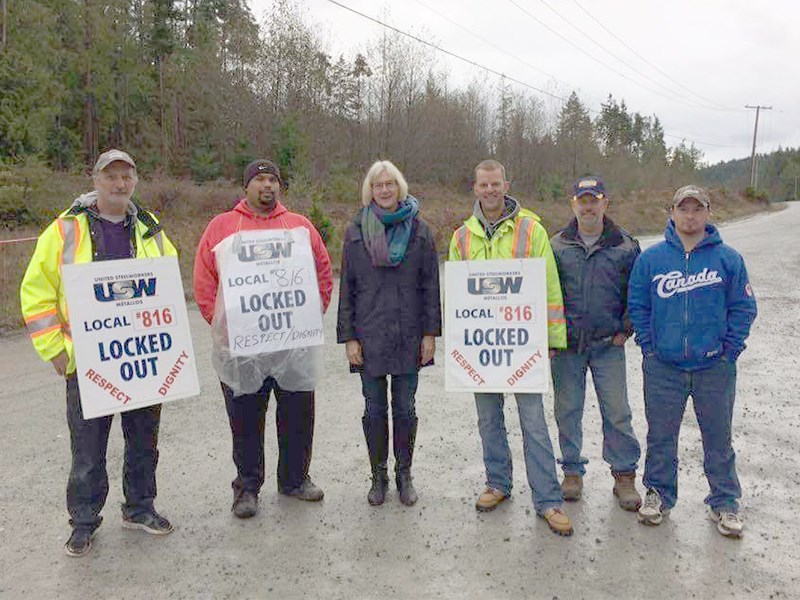As the lockout of Texada Island quarry workers meanders toward four months, hope remains that a collective agreement can be reached, says the local union president.
United Steelworkers Local 816 president Mickey Pancich said his local’s membership, about 65 workers, is full of resolve.
“The guys are still pretty strong,” said Pancich. “We’re in this for the long haul. We knew this was going to be a long fight.”
The union’s collective agreement with Texada Quarrying, a subsidiary of international conglomerate LafargeHolcim, expired last May. Membership worked without a contract until the fall, when the threat of escalating job action pushed the company to lock its workers out.
The main issue, according to the union, is over seniority and classification levels.
United Steelworkers Western Canada director Stephen Hunt said the union’s bargaining committee went to Vancouver for three days of bargaining just before Christmas and were optimistic a deal could be hammered out.
“We came very close to a deal,” said Hunt. “They showed us some numbers and we came close to an agreement, but then the following day they changed their mind.”
Pancich said he did not know if they were actually going to have a full resolution from that round of bargaining, but he said he felt it put talks on the right path.
Despite the union’s resolve to see the issue through, Pancich said 14 weeks is a long time to go without a steady paycheque for most workers.
“It has been tough. Some of us are managing, but there are a lot who have payments and a few who potentially could be losing their houses,” he added. “That’s pretty sad.”
Steelworkers have been providing lockout pay to members since the dispute began in mid-October, said Hunt.
“That comes to every member who participates in activities to convince the company that they are wrong and they have to negotiate with us to attain a collective agreement,” he said.
The amount workers receive is based on need, but is still far less than they usually receive.
Hunt added that the national union has put out a call across the country to ask other union locals to contribute to a fund that will allow the lockout line outside the quarry to stand.
Workers who are off the job due to strike or lockout are generally not able to claim employment insurance support, but Pancich explained that the local has some members working on making an appeal to Service Canada, the federal agency in charge of employment insurance, after a precedence was established in 2013.
At that time, 1,000 Stelco steel-plant workers in Hamilton, Ontario, were able to receive the assistance, after arguing that their dispute was not a normal union-company fight, but the result of international politics.
It is not clear, at this point, what argument Texada steelworkers would have to make.
“It may keep the wolves from the doors until we get this thing resolved,” said Pancich.
The Texada local still has concerns about the use of non-unionized replacement workers, consisting of the quarry’s management and office staff, doing their jobs, he said. The union has lodged several complaints with BC Labour Relations Board, but they haven’t won many of them, said Pancich.
Running the quarry without experienced operators has not been without its challenges for LafargeHolcim. In the middle of December a barge leader run by non-union staff suffered extensive damage.
The union alleges the accident happened because it was being operated by inexperienced replacement workers from administrative staff. In January, the labour relations board ruled against the union’s grievance that it was the steelworkers’ job to repair damaged barge loading machinery.
“Every time we go to the labour board we seem to get hammered,” said Pancich. “It’s not too labour-friendly.”
Pancich said his local appreciates the support it has received from Powell River and Texada communities.
“Management is digging their heels in,” he said, “but membership is sticking together on the issue here.”



